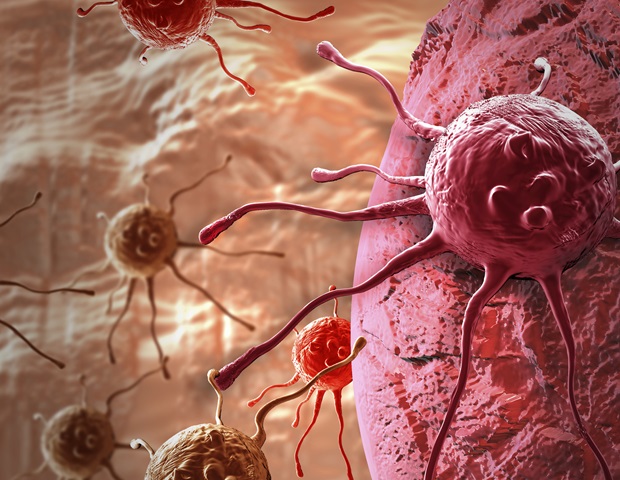One of the first signs of bladder cancer can be blood in the urine (hematuria). Investigators developed and analyzed the results of a streamlined and simplified DNA-based urine test to improve the accuracy of early detection of bladder cancer in patients with hematuria. They report in The Journal of Molecular Diagnostics, published by Elsevier, that this noninvasive test provides more accurate and earlier detection of bladder cancer, potentially reducing the need to refer patients for more invasive cystoscopy.
Lead investigator Sungwhan An, PhD, Genomictree, Inc., Daejeon, South Korea, and Promis Diagnostics, Inc., Irvine, CA, USA, explains, “Despite recommendations for cystoscopy examination in patients presenting with microscopic and gross hematuria, the diagnostic yield of bladder cancer in this group ranges from 2% to 20%, leading to numerous unnecessary procedures. Moreover, due to the invasive nature of cystoscopy and low patient compliance, many hematuria patients, particularly microhematuria patients, are not promptly referred for examination, resulting in missed opportunities for early bladder cancer detection and subsequent diagnosis at advanced stages, leading to both physical and economic burdens.”
Aberrant DNA methylation has long been recognized as a promising diagnostic biomarker in various cancer types, including bladder cancer. Therefore, to improve bladder cancer detection accuracy using urine cytology, Dr. An and co-investigators had previously developed a novel molecular diagnostic tool to measure proenkephalin (PENK) methylation levels using two steps of real-time PCR in urine DNA to detect primary bladder cancer in patients with hematuria.
They have now streamlined and optimized EarlyTect the entire process, integrating the previous two-step process into a one-step procedure incorporating two reactions of linear target enrichment (LTE) and quantitative methylation-specific PCR (qMSP) conducted via real-time PCR within a closed-single tube system: EarlyTect Bladder Cancer Detection (BCD).
Investigators tested the sensitivity and specificity of EarlyTect BCD, a single biomarker test. Results were comparable to or even better than the reported performance of other multi-biomarker tests. In a retrospective training set (105 patients), an optimal cutoff value was determined to distinguish bladder cancer from non-bladder cancer, resulting in a sensitivity of 87.3% and a specificity of 95.2%. In a prospective validation set of 210 patients (122 Korean and 88 American), the overall sensitivity for detecting all stages of bladder cancer was 81.0% with a high negative predictive value of 97.7% for distinguishing hematuria patients without bladder cancer. There was no significant difference between the two groups.
EarlyTect BCD achieved a sensitivity of 100% in detecting high-grade noninvasive papillary carcinoma and higher stages of bladder cancer.
Dr. An comments, “There is a rational imperative to accurately diagnose bladder cancer patients through noninvasive molecular diagnostic methods, particularly those with high grade noninvasive papillary carcinoma and higher stages, who exhibit a heightened propensity for disease progression. The noninvasive nature of using a urine sample and the simplified test procedure offer advantages such as facilitating access to early diagnostic opportunities, a shorter turnaround time for sample processing, and efficient, accurate, and consistent analysis of results with minimized cross-contamination.”
The findings suggest that the test could significantly impact clinical practice, particularly during the initial diagnosis of hematuria patients. Less than one in five patients presenting with hematuria referred for cystoscopy are diagnosed with bladder cancer. More accurate urine DNA results could mean that numerous cystoscopies could be avoided. Patients with a positive urine test can be actively referred to a urologist for a cystoscopy examination, which will increase the detection rate of early-stage bladder cancer.
Dr. An concludes, “With the urgent requirement for early bladder cancer detection during initial diagnosis, EarlyTect BCD emerges as a promising solution with minimal complexity, heightened robustness, and, most importantly, user-friendliness, making it easy to implement in clinical laboratory practice. These novel diagnostic approaches may revolutionize the field of bladder cancer diagnosis, reducing bladder cancer mortality rates and treatment-associated healthcare expenses.”
Urine cytology, a commonly used detection method, has limited sensitivity, especially for primary bladder cancer detection. Despite the US FDA’s approval of urine biomarker-based products, their efficacy in clinical practice for the initial diagnosis of primary bladder cancer has remained uncertain, highlighting the need for a more effective solution.
Source link : News-Medica

